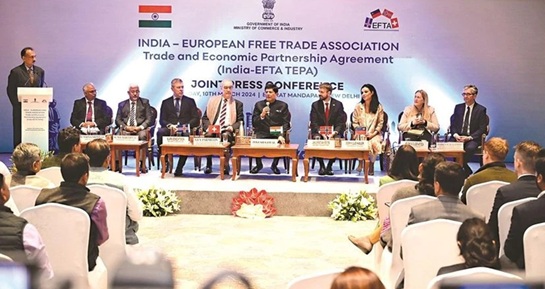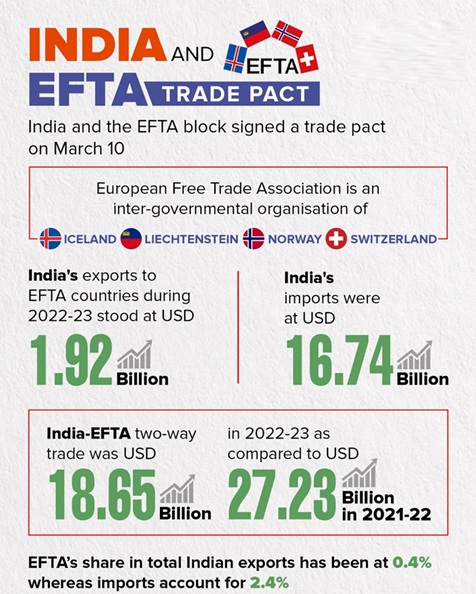(Prelims: Current Affairs)
(Mains, General Studies Paper- 2: Bilateral, Regional and Global Groupings and Agreements concerning India and/or affecting India's interests) |
Context
India has recently signed a Trade and Economic Partnership Agreement (TEPA) with the European Free Trade Association (EFTA), which will come into force from October 1, 2025.

India-EFTA Trade Agreement
- Signature Date: Signed on March 10, 2024 in New Delhi
- Entry Date: Effective from October 1, 2025
- Objective: To promote trade and investment, strengthen supply chains and stimulate economic growth
- Signatories: Commerce Minister Piyush Goyal from India and EFTA Minister for Foreign Affairs and Minister for International Cooperation and Development, Shri Narendra Modi from India. Ministers of the countries- Guy Parmelin of Switzerland, Bjarni Benediktsson of Iceland, Dominique Haessler of Liechtenstein and Jan Christian Vestre of Norway.
- Features: This is India's first such agreement which has legally binding provisions for investment and sustainable development.
Key provisions
- Investment commitment: EFTA countries will invest $100 billion over 15 years, 50 billion in the first 10 years and 50 billion in the next 5 years. This will create 1 million direct jobs in India.
- Duty reduction: India has reduced or zero duty on products like Swiss watches, chocolates, cut and polished diamonds. Switzerland has given better market access for 94.7% of India's exports (2018-2023, excluding gold).
- Products: Focus on pharmaceuticals, machinery, optical equipment and processed agricultural products.
- Sustainable development: The agreement has provisions to ensure compliance with international agreements related to environment, labour and human rights.
- Service sector: India gave concessions in 105 sub-sectors, while commitments were received from Switzerland in 128, Norway in 114, Liechtenstein in 107 and Iceland in 110 sub-sectors.
- Rules: Includes ban on business transactions, national treatment and most favoured nation provisions.
|
About EFTA block
- Establishment: Established in the year 1960 by the Stockholm Treaty
- Objective: To promote free trade and economic integration
- Member countries: Iceland, Liechtenstein, Norway and Switzerland
- Features: These countries are not members of the European Union (EU) but are part of the European Single Market and the Schengen Area.
- Economic status: Small population (1.4 crore) but leading in innovation, competitiveness and per capita wealth creation. 10th (goods) and 8th (services) in global trade.
|
Key impacts
- Positive impacts:
- Economic growth: Investment will lead to advances in infrastructure, manufacturing and technology.
- Jobs: 1 million direct and 2 million indirect jobs will be created, especially in the pharmaceuticals, chemicals and machinery sectors.
- Market access: Indian exports (e.g. organic chemicals, textiles) will get better access to EFTA markets.
- European integration: India can access EU markets through Switzerland as 40% of Swiss service exports go to the EU.
- Negative impacts:
- India’s trade deficit may increase especially with Switzerland as duty on gold imports remains unchanged.
- Gains limited in some sectors (e.g. dairy, agriculture) as these are excluded from duty concessions.

Challenges
- Trade imbalance: India's trade with EFTA in 2022-23 was $18.65 billion, with $16.74 billion in imports and only $1.92 billion in exports. Gold imports are the main reason for this imbalance.
- Barriers to agricultural exports: Complex duties and quality standards in Switzerland make export of Indian agricultural products difficult.
- Minimal duty benefits: EFTA countries already have zero or low duties, limiting additional benefits to India.
- Differences in regulations: Differences in regulations, standards and legal frameworks between India and EFTA countries complicate implementation.
- Data privacy: Some stakeholders (such as Medicines Sans Frontiers) have raised concerns over data exclusivity, which could impact the Indian generic drug industry.
Way Forward
- Investment Monitoring: Establish a strong monitoring mechanism to ensure achievement of investment targets
- Improving Agricultural Exports: Increase access to Indian agricultural products by improving quality and standards
- Awareness and Training: Educate businesses about the benefits of the agreement and ensure compliance
- European Market Expansion: Increase trade with the EU by making Switzerland a base
- Sustainable Development: Increase cooperation to enforce environmental and labour standards
- Technology Transfer: Encourage technology transfer from EFTA countries, especially in renewable energy and pharmaceuticals



